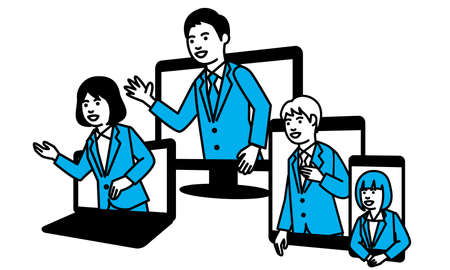The Growing Importance of Soft Skills in the American Workplace
In todays rapidly changing American job market, soft skills have emerged as a critical factor for success. While technical abilities and educational qualifications remain important, employers across the United States are increasingly prioritizing interpersonal qualities such as communication, adaptability, teamwork, and emotional intelligence. This shift is largely driven by evolving workplace dynamics—remote collaboration, diverse teams, and fast-paced change all demand more than just hard skills. As businesses strive to maintain competitive edges and foster healthy work environments, hiring managers are paying closer attention to how candidates interact with others, solve problems creatively, and respond to feedback. Demonstrating strong soft skills is now often the deciding factor between equally qualified applicants. In essence, showcasing your ability to connect and collaborate is no longer optional; it’s becoming a necessity for landing and keeping jobs in the US workforce.
2. What Do US Employers Mean by Soft Skills?
When applying for jobs in the United States, you’ll often see “soft skills” listed as a must-have requirement. But what exactly does this term mean to American employers? While technical abilities and job-specific knowledge are important, US employers consistently emphasize soft skills because these traits help teams work more effectively, adapt to change, and build a positive workplace culture.
Key Soft Skills Valued by American Employers
Here’s a breakdown of the top soft skills that US employers look for—and why they matter:
| Soft Skill | Description | Why It Matters to US Employers |
|---|---|---|
| Communication | The ability to clearly express ideas, listen actively, and engage in open dialogue—both verbally and in writing. | Ensures that team members understand goals, provide feedback, and resolve conflicts efficiently. |
| Adaptability | The capacity to adjust quickly to new situations, technologies, or changes in direction. | Helps organizations stay competitive and employees thrive during periods of change. |
| Teamwork | Working well with others toward shared objectives; respecting diverse perspectives and collaborating effectively. | Encourages innovation and strengthens team performance across departments. |
| Emotional Intelligence (EQ) | The awareness of your own emotions and the ability to empathize with others; managing relationships thoughtfully. | Promotes a healthy work environment and improves leadership potential at all levels. |
The Importance of Demonstrating Soft Skills During the Hiring Process
It’s not enough to simply list these qualities on your resume. During interviews and even in cover letters, American employers expect candidates to provide real-life examples that show how they’ve used communication, adaptability, teamwork, and emotional intelligence in past roles. Failing to demonstrate these skills can be a major red flag—even if you have an impressive technical background. By understanding what these soft skills mean in the US context and preparing clear examples, you’ll stand out as a strong candidate who can contribute positively to any organization.

3. Common Pitfalls: How Candidates Often Undersell Their Soft Skills
Many job seekers underestimate the importance of effectively communicating their soft skills throughout the job search process. While technical qualifications are essential, employers in the US increasingly prioritize interpersonal abilities, adaptability, and problem-solving skills. However, candidates frequently fall into several traps that prevent them from showcasing these vital attributes.
Overly Generic Language on Resumes
A major misstep is relying on vague buzzwords like “team player,” “good communicator,” or “hard worker” without providing context or examples. US employers look for evidence—stories or quantifiable results—that demonstrate how you applied these skills in real-world situations. Simply listing soft skills doesn’t set you apart; instead, integrate them into your achievements and responsibilities to make your strengths clear and memorable.
Missing Behavioral Examples in Interviews
During interviews, many candidates stumble when asked behavioral questions such as “Tell me about a time when you faced a conflict at work.” Instead of offering concrete stories, they often give generic answers or focus only on technical solutions. US hiring managers want to hear about your thought process, emotional intelligence, and how you navigate workplace dynamics. Failing to prepare specific STAR (Situation, Task, Action, Result) examples can lead to missed opportunities to highlight your soft skills.
Ignoring Cultural Fit and Adaptability
Another common pitfall is neglecting to address cultural fit and adaptability—key concerns for American employers. Candidates may overlook mentioning how they’ve adapted to new environments or collaborated with diverse teams. Employers value professionals who can thrive in dynamic workplaces and contribute positively to company culture. Not addressing this can make it seem like you lack awareness of what’s important in the US job market.
Underestimating Nonverbal Communication
Finally, candidates often forget that soft skills are also communicated nonverbally through body language, eye contact, and listening skills during interviews—both virtual and in-person. In the US, confidence, active engagement, and professionalism are highly valued. Overlooking these cues can inadvertently undermine your credibility and likability, even if your resume looks impressive on paper.
4. Proving Your Soft Skills: Practical Strategies
Knowing how to showcase your soft skills is essential for landing a job in the US market. It’s not enough to simply list “communication” or “teamwork” on your resume—employers want to see real evidence of these abilities in action. Here are actionable strategies and real-life examples to help you effectively demonstrate your soft skills during the job search process.
Leverage Storytelling in Interviews
When US employers ask behavioral questions, they’re looking for concrete examples of how you’ve used your soft skills in real situations. Use the STAR method (Situation, Task, Action, Result) to structure your answers. For instance:
| Soft Skill | Sample Question | How to Answer (STAR Example) |
|---|---|---|
| Communication | “Tell me about a time you had to explain something complex.” | S: Led a project update meeting. T: Explain technical details to non-technical team. A: Broke down jargon into simple terms and used visuals. R: Team understood next steps, leading to project success. |
| Problem-Solving | “Describe a challenge you faced and how you handled it.” | S: Deadline was moved up unexpectedly. T: Deliver work on time. A: Prioritized tasks, delegated work. R: Met new deadline without sacrificing quality. |
| Teamwork | “Give an example of working with others toward a goal.” | S: Group project with tight timeline. T: Ensure everyone contributed. A: Organized weekly check-ins, encouraged open feedback. R: Finished ahead of schedule, received positive feedback from management. |
Showcase Soft Skills on Your Resume and LinkedIn Profile
Instead of vague statements, quantify your impact wherever possible. For example, instead of saying “Good at teamwork,” try “Collaborated with a cross-functional team of 8 to launch a new product within 6 months.” Use bullet points that highlight both the skill and the result.
Resume Example:
- Effective Communication: Presented weekly progress reports to stakeholders, resulting in 20% faster decision-making processes.
- Leadership: Mentored 3 junior colleagues, contributing to their promotion within one year.
Ask for Recommendations and Endorsements
US employers often check LinkedIn profiles for endorsements and recommendations. Ask previous managers or colleagues to write recommendations that specifically mention your soft skills. This third-party validation is highly valued in American workplace culture.
Recommendation Request Template:
“Hi [Name], I’m updating my LinkedIn profile as I pursue new opportunities. Would you be willing to write a brief recommendation highlighting my teamwork or communication skills? I’d really appreciate it!”
Demonstrate Soft Skills During the Application Process
Your professionalism and interpersonal skills can shine through even before the interview. Respond promptly to emails, communicate clearly, and express gratitude after each interaction (for example, by sending a thank-you note after interviews). These small actions build a strong first impression and prove that you have the soft skills US employers are seeking.
5. The Bottom Line: How Soft Skills Influence Hiring and Career Growth
If you’re aiming for success in the American workplace, mastering soft skills isn’t just a “nice to have”—it’s a must. Employers across the United States consistently emphasize qualities like effective communication, adaptability, teamwork, and emotional intelligence because these attributes are directly linked to organizational success. When it comes to hiring decisions, candidates who can clearly demonstrate strong soft skills are far more likely to stand out from the crowd. It’s not enough to simply list these skills on your resume; US employers want to see real-life examples in interviews and on-the-job scenarios that prove you can collaborate, problem-solve, and lead with empathy.
Securing the Job Offer
During the recruitment process, hiring managers pay close attention to how you interact—not only with them but also with potential team members and other staff. Candidates who actively listen, articulate their thoughts well, and respond thoughtfully to situational questions often move ahead in the selection process. In a competitive job market, strong soft skills can be the deciding factor between two equally qualified applicants.
Thriving at Work
Once you land the job, soft skills become essential for building positive relationships with colleagues and supervisors. In US workplaces, collaboration is highly valued; being approachable, respectful of diverse perspectives, and able to resolve conflicts constructively will help you integrate smoothly into any team environment. These interpersonal abilities also contribute to greater job satisfaction and productivity—qualities that don’t go unnoticed by management.
Advancing Your Career
Your professional growth depends on more than just technical expertise. In fact, most promotions and leadership opportunities are given to those who consistently display initiative, emotional intelligence, and adaptability under pressure. By cultivating your soft skills, you position yourself as someone who can not only do the job but also inspire others, manage change effectively, and contribute positively to company culture—all key factors in climbing the career ladder in America’s dynamic workplace landscape.


